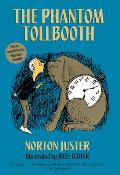The Phantom Tollbooth in Its Time
In a New Yorker article about the fiftieth-anniversary editions of Norton Juster’s The Phantom Tollbooth, Adam Gopnik wrote:
The “coming of age” that Gopnik mentions occurred decades, perhaps a century, before Juster started writing. Such obvious “moralizing allegory” was long gone. Sure, there were still moralizing tales like Betty MacDonald’s Mrs. Piggle-Wiggle (1947-), and William Pène du Bois was about to tackle the deadly sins (1966-). Even today, most people expect novels to leave children with a sense of hope and other subtle nudges in a right direction. But allegorical characters that spell out their valuable lessons about life without a wink—those were as old-fashioned as Pilgrim’s Progress.
The Phantom Tollbooth brought back the form, but its characters have less to say about morals than about intellect. Milo learns to see the world from different perspectives, not to jump to conclusions, and other rules of proper abstract thought. The book depicts using one’s intellect to be as important as much earlier allegories had urged readers to use their piety and/or moral sense.
It’s a commonplace of scholarship to insist that children’s literature came of age when it began to break away from the authoritarian model of the moralizing allegory. Yet “The Phantom Tollbooth” is an old-fashioned moralizing allegory, with a symbolic point at every turn.And that’s why the book can grate on adults like Peter Sagal.
The “coming of age” that Gopnik mentions occurred decades, perhaps a century, before Juster started writing. Such obvious “moralizing allegory” was long gone. Sure, there were still moralizing tales like Betty MacDonald’s Mrs. Piggle-Wiggle (1947-), and William Pène du Bois was about to tackle the deadly sins (1966-). Even today, most people expect novels to leave children with a sense of hope and other subtle nudges in a right direction. But allegorical characters that spell out their valuable lessons about life without a wink—those were as old-fashioned as Pilgrim’s Progress.
The Phantom Tollbooth brought back the form, but its characters have less to say about morals than about intellect. Milo learns to see the world from different perspectives, not to jump to conclusions, and other rules of proper abstract thought. The book depicts using one’s intellect to be as important as much earlier allegories had urged readers to use their piety and/or moral sense.



No comments:
Post a Comment